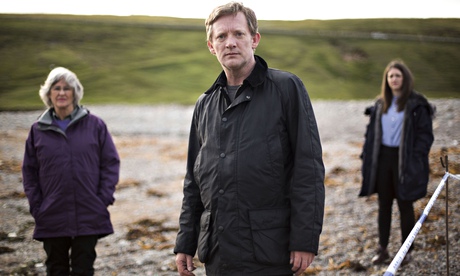
In the novel Raven Black by Ann Cleeves, from which the first two-part story of Shetland (BBC1) is adapted, it's winter and the islands are covered in a thick layer of snow when a girl's body is discovered. Here they've changed the season, to the very opposite, mid-summer, when it never properly gets dark. Perhaps it was to make filming easier, to literally shed light on proceedings.
Certainly it means we get to see the eerie, sad landscape and grey skies that are so much a part of it. And actually it's just as effective a backdrop – constant light is very nearly as oppressive and depressing as constant dark. A community, including DI Jimmy Perez (Douglas Henshall), is already on edge through lack of sleep when the body is found. Remember Al Pacino in Insomnia? Like that.
There is something of Insomnia about Shetland – murder and mysterious northern mist. Also of The Killing, The Bridge, Wallander etc. Celtic Noir is the new Nordic Noir, don't you know? Actually they're pretty much Vikings up there in Shetland anyway, aren't they? It's actually further north than any of those Scandi cop shows, same latitude as the tip of Greenland.
The body of Catherine Ross lies on the beach with the flood tide lapping at her feet and ravens pecking at her flesh. Is that an unkindness of ravens, or a storytelling? Both fit. Unless they're crows of course, in which case it's a murder? Also apt. They haven't gone for her eyes yet thankfully – I thought they pecked out the eyes; perhaps it's just lambs' ones they like.
On the hill up above, an eccentric old loner called Magnus Bain (non-prof Brian Cox, the standout performance along with the coastline) lives alone in his croft with his own pet raven. This one is caged, perhaps so it doesn't peck out Magnus's eyes when he sleeps. Except he's not sleeping at the moment, no one is. Catherine dropped in on Magnus in his shack the previous day, for cake. The villagers have already reached their conclusions. But Perez isn't going to let a witch-hunt get in the way of his investigation, even when it emerges that another girl who went missing 19 years ago lived in the same house as Catherine. Perez does things by the book, and on the blackboard, with chalk – they haven't got those fancy see-through ones for solving crimes in Shetland.
There are other intriguing characters who need investigating: a playboy trawlerman with a taste for inappropriate youth; a moralistic primary schoolteacher; another teacher, from England, who came to Shetland because he wanted to be somewhere there's "scope to make a real difference, you know, hearts and minds". Tosser.
Perez himself is an outsider, from the south – from Fair Isle, half way to Orkney. You'd think there'd be some impressive knitwear on show, to rival Sarah Lund's, but sadly not. Wrong time of year I guess.
Shetland doesn't have the scale and ambition of The Killing or The Bridge (though imagine how good we'd think it was if there were subtitles). There are three two-part adaptations, so there's not going to be that same opportunity for long-form storytelling, unravelling as it goes along; I don't think I'm going to be lying awake at night, puzzling it over, worrying about what happened to poor Catherine. But Perez will remain; there's the opportunity for him, already an interesting character, to develop.
Shetland is good at character. And especially good at portraying a community. A small, suspicious community living on the edge of the world. It's also a gripping police drama. And beautiful to look at. A good call, I think – to film when you can see it.
This is interesting: Original Drama (BBC iPlayer), three short films – Flea, My Jihad and Tag – showcasing new talent and aimed at a younger audience. Younger than me I think. I'm not crazy about any of the films; they're a bit film-school-short-filmy, self-conscious and with the inevitable twists that short films seem to require. Flea, delivered in rhyme, is the best.
But it's interesting that the BBC is launching new stuff on iPlayer, which will continue to develop exclusive content. Add to that the news about BBC3 going online only, and maybe this is the future of television? And what are the implications for the licence fee? Discuss.

